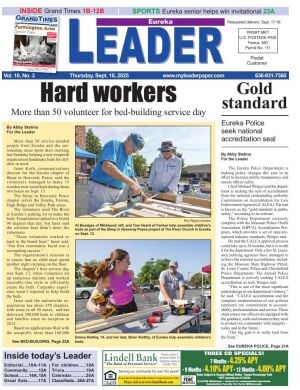The owner of a lawfully nonconforming mobile home community in Cedar Hill will not be allowed to add more homes to the development following a recent Jefferson County Council decision.
On Sept. 9, the council denied the Jefferson County Planning and Zoning Commission’s recommendation to approve a request from Paradise Estates, a St. Louis company, to rezone a 7.6-acre property at 1 Paradise Estates Drive from large lot residential to planned mixed residential, which allows for a higher density of residences per acre.
A mobile home community with nine residents currently is located on the property at Hwy. B and Cedar Hill Road.
Owner Robert Brake said the zone change would have allowed his company to add 40 more concrete pads on which future tenants could have placed mobile homes, adding that he was not aware his property was nonconforming when he purchased it in 2020.
“(The property) has been a mobile home park since before the 1970s,” Brake said. “In 1991, there was a (countywide rezoning effort), and this park didn’t meet the requirements, so (the county) changed (the zoning), no one ever said anything and life went on. We’re just trying to change it back to make it a nice, clean park and put a sewer treatment plant in, bring some new pads – homes – in and fill it up and give people a nice place to live.”
That wasn’t enough for the County Council, which voted 5-1 to deny the recommendation, with Scott Seek (District 5, Festus) casting the lone vote to approve the application. Councilman Dan Stallman (District 6, De Soto) was absent from the meeting.
Councilman Bob Tullock (District 7, House Springs) said a few factors contributed to his vote to deny the application, adding that he didn’t want to see too many new homes put in the community.
He also said the area around the mobile home park is rural and not conducive to higher-density zoning.
“When you approve the rezoning, they could do up to 18 units per acre,” he said. “That would have been excessive. Whether or not they would have done that or not, I don’t know, but it opens that possibility.”
At the Sept. 9 meeting, Tullock said he was concerned with recent developments recommended to the council for approval.
He said that the process of rezoning property can sometimes be rushed and that nearby residents aren’t properly notified or educated about how the rezoning process works before it’s too late to add their input.
“Many of these residents have lived on their land for decades, in some instances a century or more,” Tullock said. “Many residents chose to move to Jefferson County because we offered large lots at an affordable price. Now imagine that you decided to buy a piece of property in a (low-density zone) only to find out that some other landowner or their heirs decided to sell off their family farm and the buyer now proposes to rezone to R10, R7, PR1 and PR2.”
Tullock said as the county formulates its new 20-year master plan, he plans to propose changes to the zoning process. The master plan is expected to be complete by next year.
When a zoning petition is first sent to the P and Z commission, Tullock said nearby residents often don’t have enough time to process the request and provide evidence either supporting or opposing the petition. Additionally, many residents don’t understand what zones indicate or what a rezoning could mean for a particular area.
“The system is actually broken,” he said. “These redevelopment issues that come up (to the commission) should be open and transparent to the public. The problem is that the residents receive notice about the meeting maybe two or three weeks beforehand and most of them have no idea what (the zones) mean.”
Tullock also wants the county to analyze the long-term effects of zone changes in certain areas. He said an “evaluation mechanism” needs to be put in place to study new developments years after they’re finished.
“Once we allow these multifamily and high-density subdivisions, what kind of long-term impact are we going to be looking at on our roadways? Are we looking at higher water demands? Sewer demands? I think we should look into these long-term effects,” he said.




